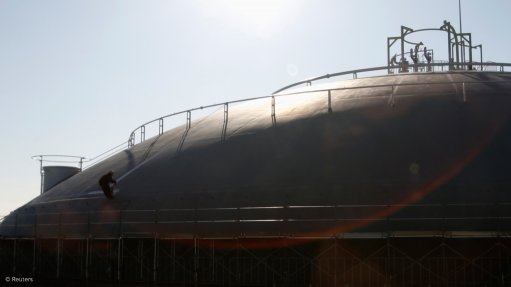
Photo by: Reuters
South Africa should make the most of the massive shake-up in the global gas agenda, which is making natural gas increasingly viable as an energy source, says Western Cape Department of Development and Tourism energy director Jim Petrie.
He told a South African National Energy Association meeting, in Cape Town, on Thursday, that natural gas could be an increasingly attractive option given the severe energy shortage in South Africa and the need to diversify from coal to other energy sources.
Gas made up only about 3% of South Africa’s total primary energy consumption, split between PetroSA and Sasol. Petrie believed this should be far higher.
Major offshore gas discoveries in Tanzania, but particularly in Mozambique, had rekindled interest in expanding the use of natural gas.
“We are seeing a supply opportunity that has become associated with the shale gas bounty, but is also enabled by technology. The big thing that has shifted the gas opportunity globally is liquefied natural gas (LNG). This has exploded the way in which gas moves around the world in a competitive economic environment,” said Petrie.
The Western Cape government had conducted an extensive market update to verify the value of the “convertible” gas market.
Petrie said Saldanha Bay on the West Coast was considered the Western Cape’s preferred destination for LNG. It offered opportunities for gas-fired power, fuel switching, transmission and distribution.
There was a need for gas-fired power plants, with support from public–private partnerships and national government for building the terminal and gas-piping infrastructure. Petrie said government would need to defray some of the costs.
Despite the costs and risks, Petrie, who was also Emeritus Professor of Chemical Engineering at the University of Sydney, saw the development of gas as a boon.
He believed there was room for far more gas to be used by residents in the Western Cape.
“The Western Cape’s residential consumption is only 9% out of the province as a whole. I believe upwards of 85% of our domestic energy footprint could be met by gas.”
But he said it was vital to create the market. He said the economic viability was dependent on the cost of gas, the size of the market and its willingness to pay, as well as global pricing structures.
“The exploitation of available gas resources could significantly change South Africa’s future. There’s no shortage of opportunities if the price is right. We need to create a market.”
He said the cost of gas would change as a function of scale and South Africa is “learning in the gas space”.
“The more we learn, the more efficient we’ll become, and the cheaper the cost of gas.”